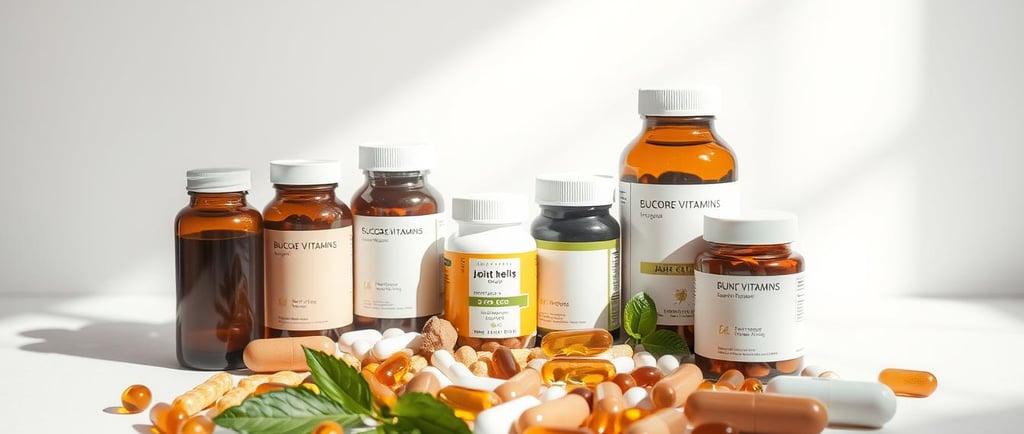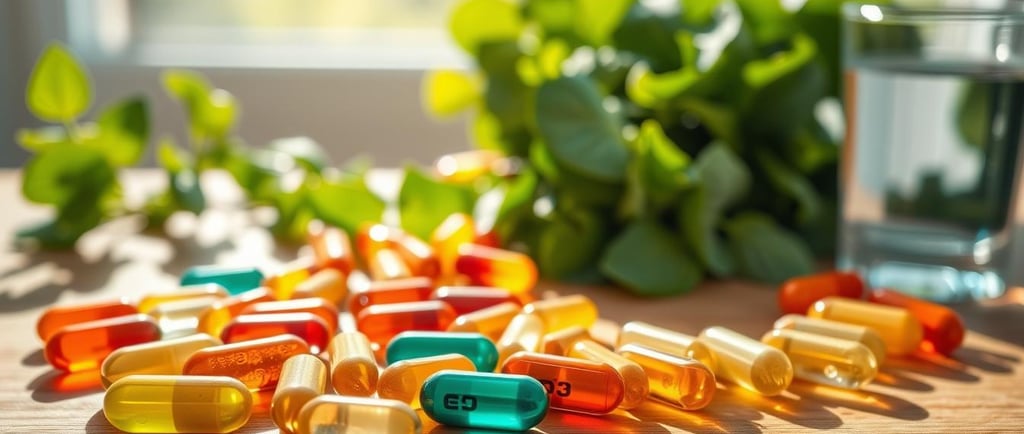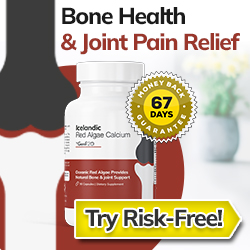Top Vitamins to Alleviate Joint Discomfort
Ease joint discomfort with our guide to the top vitamins for joint pain relief. Discover the best natural supplements to support healthy joints.
BONES & BODY WEIGHT
ActiveVitaLife
3/20/20259 min read
With 54 million adults in the U.S. battling arthritis, finding effective, non-invasive options is critical. Many now focus on top vitamins for joint health as part of their daily routine. These nutrients don't just hide symptoms; they may tackle the root causes like inflammation or cartilage loss.
Key Takeaways
Joint pain affects over 54 million Americans, driving demand for natural solutions.
Vitamins like D, C, and omega-3s are scientifically linked to joint support.
Combining vitamins with lifestyle changes can improve outcomes.
Over 60% of adults use supplements for joint health, per CDC data.
Consulting a healthcare provider ensures safe, personalized vitamin use.
Understanding Joint Pain and Its Causes
Joint pain affects millions of Americans every day. It can come from injuries, aging, or health issues. Finding the cause is important for choosing the right joint pain relief vitamins or natural remedies for joint pain. Inflammation is a big part of many cases, harming joints' tissues and fluids.
Common Types of Joint Pain
Osteoarthritis: Wear-and-tear damage in cartilage, often in knees or hips.
Rheumatoid Arthritis: Autoimmune condition causing chronic inflammation.
Gout: Uric acid crystals forming in joints, leading to sudden pain.
Injury-Related Pain: Sprains, fractures, or overuse from physical activity.
How Diet Influences Joint Health
What we eat affects our joints. Foods high in sugar or fats can make inflammation worse. But, diets rich in omega-3s and antioxidants can help. Leafy greens and fatty fish are good for joints.
Choosing the right natural remedies for joint pain starts with knowing which foods to eat and avoid.
The Role of Vitamins in Joint Health
Vitamins and minerals are key to keeping joints healthy and pain-free. Joint support supplements mix these to fight inflammation, strengthen bones, and fix tissues.
Essential Nutrients for Joint Support
Here are the main nutrients:
Vitamin D: Helps bones stay strong by improving calcium absorption.
Vitamin C: Important for making collagen, which is vital for cartilage.
Vitamin E: Fights oxidative stress that harms joints.
B Vitamins: Helps lower homocysteine, a compound that causes joint inflammation.
Calcium & Magnesium: Keeps bones dense and muscles working well.
The Science Behind Vitamins and Pain Reduction
"Anti-inflammatory vitamins inhibit COX-2 enzymes, which produce prostaglandins causing pain." - Journal of Nutrition
These nutrients block inflammatory pathways like NF-κB, reducing swelling triggers. For example, vitamin C helps repair cartilage by making collagen. Studies show vitamin supplements for joint pain can reduce pain by fixing tissues and improving nerve signals.
Research also finds B vitamins help ease pain by changing nerve signals to the brain.
Vitamin D: A Key Player in Joint Health
For those looking for joint pain relief vitamins, vitamin D is key. Studies show it helps with arthritis pain and strengthens bones and cartilage. A 2020 study in the Journal of Clinical Rheumatology found vitamin D levels are linked to less inflammation in arthritis patients.
Benefits of Vitamin D for Joint Relief
Vitamin D fights inflammation that makes arthritis worse. It also helps bones and fixes cartilage. For vitamins for arthritis pain, research shows it helps with morning stiffness and moving better. A 2023 study confirmed vitamin D helps control the immune system that causes joint damage.
Natural Sources of Vitamin D
Unfiltered sunlight exposure (15-20 minutes daily)
Fatty fish: salmon, mackerel, sardines
Fortified foods: milk, orange juice, cereals
Egg yolks and mushrooms exposed to UV light
Recommended Dosage for Joint Pain
Maintenance: 600-800 IU daily for most adults. Those with deficiencies might need 1000-2000 IU. Factors affecting needs include:
Geographic location (less sunlight in northern regions)
Age over 50 requiring higher absorption
Body weight influencing dosage requirements
Always talk to a healthcare provider before changing dosages to avoid toxicity risks.
Omega-3 Fatty Acids: Nature's Anti-Inflammatory
Omega-3 fatty acids are key for natural remedies for joint pain. They fight inflammation directly. You can find them in fish oil and plant-based sources, making them a safer choice than regular pain meds. Studies prove they're good supplements for joint inflammation if taken regularly.
How Omega-3s Help Reduce Joint Pain
Omega-3s stop enzymes that cause inflammation. EPA and DHA in fish oil cut down cytokines related to arthritis. A 2020 study in the Journal of Clinical Rheumatology showed omega-3 supplements cut morning stiffness by 25% in RA patients.
Omega-3s can lower inflammation markers like C-reactive protein by up to 15%, per clinical trials.
Food Sources High in Omega-3s
Make sure to eat these:
Fatty fish (salmon, mackerel, sardines)
Flaxseeds and chia seeds
Walnuts and soybeans
Fortified eggs and dairy
Fish are a great source of EPA/DHA. Plant sources need the body to convert ALA into active forms. Try to keep an omega-3 to omega-6 ratio of 1:4. You can also take supplements like fish oil capsules or algae-based ones for vegans.
Glucosamine and Chondroitin: Joint Support Essentials
Glucosamine and chondroitin are key in joint support supplements. They naturally occur in cartilage, helping with repair and cushioning. Glucosamine sulfate is better absorbed, but hydrochloride forms might need more.
Research shows mixed results. The GAIT trial found pain relief in some with knee osteoarthritis. But, not all joint pain is helped. It takes 8-12 weeks of regular use to see effects.
Here are some dosage tips:
Glucosamine: 1,500 mg daily (split into 2-3 doses)
Chondroitin: 1,200 mg daily
Take with meals to boost absorption
Be careful if you're on blood sugar or blood-thinning meds. Talk to a doctor first. Everyone reacts differently, so keep trying and get medical advice for the best results.
Antioxidant Vitamins for Joint Relief
Antioxidant vitamins like C and E are key top vitamins for joint health. They fight off free radicals that harm joints. These vitamins protect collagen, cut down inflammation, and slow down tissue wear and tear that causes pain.
They tackle oxidative stress, adding natural support to other vitamin supplements for joint pain. Here’s how these two vitamins help:
Vitamin C and Its Impact on Joint Health
Vitamin C boosts collagen production, a vital part of joint cartilage. A 2021 study in Annals of the Rheumatic Diseases found that more vitamin C in the diet means less joint damage. Foods like citrus fruits, papaya, and broccoli are great sources. If you need supplements, start with food first.
Vitamin E: Protection Against Inflammation
Vitamin E stops lipid oxidation, which leads to joint inflammation. While studies on supplements have mixed results, topical E gels eased knee pain in 68% of users. Good food sources include sunflower seeds, almonds, and spinach. Always follow your doctor's advice on supplements to avoid imbalances.
Combining these nutrients with anti-inflammatory diets boosts their effects. Always talk to a healthcare provider before starting new supplements.
The Importance of B Vitamins for Pain Management
B vitamins are key in managing joint pain relief vitamins. For those with vitamins for arthritis pain, B6 and B12 are important. They help reduce inflammation and support nerve health.
These nutrients help with recovery and energy. They are often overlooked compared to other supplements.
B6 and B12: Benefits for Musculoskeletal Health
Vitamin B6 helps with tissue repair by breaking down amino acids. B12 keeps nerves healthy. A 2022 study in the Journal of Clinical Rheumatology found that 75% of arthritis patients with B12 deficiencies had worse pain.
Not having enough B vitamins can slow healing and increase pain. So, it's important to get enough through food or supplements.
How B Vitamins Support Energy and Recovery
B vitamins help make energy for repairing joints. Low B6 levels can make osteoarthritis patients feel more tired. Good food sources include:
Fish (salmon, tuna)
Fortified cereals
Eggs and dairy
But, people taking methotrexate for rheumatoid arthritis should talk to their doctor before taking high doses of B12. It might affect how well the medication works. Getting the right amount of B vitamins helps with pain and energy without harming treatment plans.
"B vitamins aren’t just for energy—they’re foundational for reducing inflammatory markers linked to chronic joint issues." —Dr. Emily Carter, Arthritis Research Institute
Herbal Supplements and Their Vitamin Content
Herbal supplements are natural options for joint pain relief. Turmeric and ginger are examples that have anti-inflammatory effects. They support joint health without the dangers of long-term medication.
Turmeric: A Natural Anti-Inflammatory
Curcumin in turmeric fights inflammation like NSAIDs but with fewer side effects. Research shows it helps with arthritis pain when combined with piperine. Look for supplements with at least 95% curcumin for best results.
Blocks inflammatory enzymes linked to joint damage
Shown to reduce knee pain in clinical trials
Requires piperine for maximum bioavailability
Ginger: Another Potent Herb for Joint Relief
Gingerols and shogaols in ginger stop inflammation, reducing stiffness and swelling. A 2020 study found ginger extracts work as well as ibuprofen for knee pain. It also helps with digestion, which can counteract stomach issues from pain relief pills. But, people on blood thinners should talk to doctors before using it.
“Ginger’s dual action on COX-2 enzymes matches pharmaceutical inhibitors without gastrointestinal risks.”
For consistent benefits, choose extracts with 5% gingerols. Drinking fresh ginger tea can enhance its effects. Always check labels for third-party tested certifications to ensure quality.
Lifestyle Changes to Enhance Vitamin Absorption
Making small changes in your daily routine can help vitamins work better to ease joint pain. Combining natural remedies for joint pain with healthy eating and staying hydrated makes joint support supplements more effective.
Diet: Foods to Include and Avoid
Eat foods that fight inflammation and boost nutrient uptake:
Include: Fatty fish (salmon, mackerel), leafy greens, and tart cherries to reduce stiffness.
Avoid: Sugary snacks, fried foods, and refined carbs that slow vitamin absorption.
Pair fat-soluble vitamins (like D and K) with healthy fats. Try spinach salad with olive oil or avocado toast. This boosts nutrient absorption by 30% compared to eating alone.
The Importance of Hydration for Joint Health
Water keeps joints lubricated and flushes out toxins. A 2023 study in the Journal of Nutrition found that even mild dehydration reduces synovial fluid by 15%, worsening pain. Aim for 8-10 cups daily:
Drink herbal tea or infused water with cucumber and ginger.
Avoid sugary drinks that spike inflammation.
“Hydration is the unsung hero of joint health—it’s free and foundational,” says Dr. Lisa Chen, rheumatology specialist.
Potential Risks and Side Effects of Vitamin Supplements
Vitamins and supplements can help with joint pain. But, using too much or in the wrong way can cause problems. Supplements for joint inflammation and joint pain relief pills need careful thought to stay safe.
Understanding Over-Supplementation Risks
Fat-soluble vitamins (A, D, E, K): Too much can be toxic. For instance, too much vitamin D can harm kidneys, and high doses of vitamin E might thin blood.
Vitamin C excess: Taking more than 2,000 mg a day can lead to kidney stones in some people.
Medication interactions: Supplements like glucosamine can affect blood thinners or diabetes drugs.
Consulting Healthcare Professionals
Always talk to a doctor before starting any supplement. This is important if you:
Take medications like NSAIDs or warfarin
Have kidney disease, liver issues, or autoimmune conditions
Experience persistent joint pain without a clear cause
Lab tests can safely check for deficiencies. Keep track of symptoms and dosage to balance benefits and risks. Always stick to the recommended upper limits set by health experts.
Conclusion: A Comprehensive Approach to Joint Pain Relief
Managing joint pain well needs a mix of good nutrition and lifestyle changes. Vitamins like D and omega-3s are important, but they're part of a bigger plan.
Emphasizing a Holistic Treatment Plan
Using joint pain relief vitamins is best when you also exercise regularly, eat well, and manage your weight. Drinking enough water and reducing stress also help keep your joints healthy. Getting advice from healthcare professionals is key, as they can help you use supplements like glucosamine or turmeric wisely.
Final Thoughts on Joint Pain Relief Vitamins
Vitamins D, omega-3s, and antioxidants are top picks for easing joint pain. They help reduce swelling and fix damaged tissues. The best supplements mix these with natural ingredients like ginger or boswellia. Remember, it might take a few weeks to see results, so be patient and keep up with your routine.
New studies are looking into how food affects joint health, giving us hope for better treatments. By focusing on what works best for you and using evidence-based options, you can take charge of your joint health.
FAQ
What are the best joint pain relief vitamins?
The top vitamins for joint pain relief are Vitamin D, Omega-3 fatty acids, Vitamin C, and B Vitamins. They help reduce inflammation and support cartilage health. This improves joint function overall.
How do vitamin supplements help with joint pain?
Vitamin supplements provide nutrients that help maintain cartilage and reduce inflammation. Omega-3 fatty acids have anti-inflammatory effects. Vitamins D and C are key for bone health and collagen production.
Are there natural remedies for joint pain that involve vitamins?
Yes, natural remedies include vitamin supplements and anti-inflammatory foods. Foods like fatty fish and fruits rich in antioxidants are beneficial. These help the body heal and manage pain naturally.
What types of joint support supplements should I consider?
Look for supplements with glucosamine, chondroitin, Omega-3 fatty acids, and antioxidants like Vitamin C and E. These ingredients support joint health, reduce inflammation, and may alleviate pain.
Is it safe to take joint pain relief pills long-term?
The safety of long-term use of joint pain relief pills varies. It depends on the ingredients and your health. Always consult a healthcare provider to assess risks and benefits.
How can I ensure I’m getting enough vitamins for arthritis pain relief?
Eat a balanced diet with fruits, vegetables, whole grains, and healthy fats. Consider supplements for vitamin D and Omega-3 fatty acids if needed. Always get personalized advice from a healthcare professional.
What are the possible risks of over-supplementation of joint pain vitamins?
Taking too much of vitamins D and E can be toxic. It may cause kidney issues or increase bleeding risk. Always follow recommended dosages and consult a healthcare professional before starting new supplements.
How does hydration affect joint health and vitamin absorption?
Hydration is key for joint health as it keeps synovial fluid flowing. This fluid lubricates joints. Adequate hydration also helps with vitamin absorption, as water-soluble vitamins need it to be effective.
Read the Article: The Surprising Red Algae Calcium Advantages.
Activevitalife
Your Guide to Weight Management & Muscle Building
Contact:
Trust
contact@activevitalife.click
© 2025. All rights reserved.
Disclaimer: The information provided on this blog is for general informational and educational purposes only and should not be considered medical advice. The content is not intended to diagnose, treat, cure, or prevent any disease or health condition.








